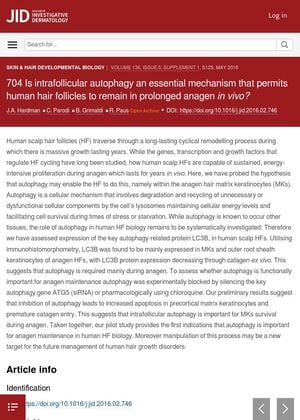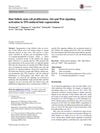Is Intrafollicular Autophagy an Essential Mechanism That Permits Human Hair Follicles to Remain in Prolonged Anagen In Vivo?
April 2016
in “
Journal of Investigative Dermatology
”

TLDR Autophagy, a cell recycling process, is crucial for prolonged hair growth and could be a potential target for treating hair growth disorders.
The 2016 study investigated the role of autophagy, a cellular mechanism that degrades and recycles unnecessary or dysfunctional cellular components, in the prolonged growth phase (anagen) of human scalp hair follicles. The researchers found that the autophagy-related protein LC3B was mainly expressed in the anagen hair matrix keratinocytes (MKs) and outer root sheath keratinocytes of anagen hair follicles, with its expression decreasing through the regression phase (catagen) ex vivo. When autophagy was experimentally blocked, either by silencing the key autophagy gene ATG5 or using chloroquine, there was an increase in cell death in precortical matrix keratinocytes and premature entry into the catagen phase. These findings suggest that intrafollicular autophagy is important for MKs survival during the anagen phase, and manipulating this process could potentially be a new target for managing human hair growth disorders.





